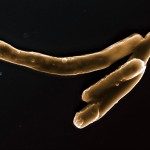Lien vers Pubmed [PMID] – 18515114
Trends Microbiol. 2008 Jul;16(7):303-8
Most mycobacteria are environmental species, causing disease only occasionally when they encounter a susceptible human or animal host. A few species, such as Mycobacterium tuberculosis and Mycobacterium avium, have acquired the ability to parasitize host macrophages during the course of evolution and have become major pathogens. Recent genetic studies in these two species have suggested that early episodes of horizontal transfer of genomic islands from surrounding environmental species might have contributed to the evolution towards this virulence phenotype, possibly by helping bacilli to persist in protozoa and, subsequently, in mammalian phagocytes. A better understanding of the function of the proteins encoded by these genomic islands in mycobacterial metabolism might help to define novel targets for the development of future antimicrobials.

